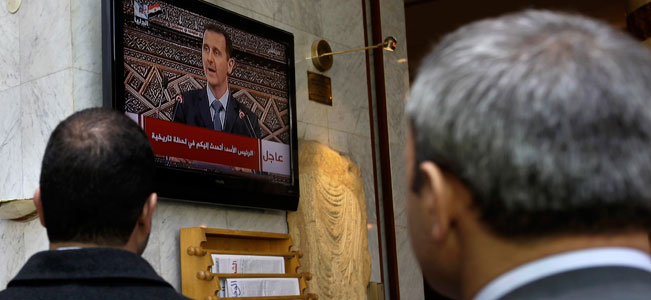(Associated Press) - DAMASCUS, Syria – Syrian President Bashar Assad blamed "conspirators" Wednesday for an extraordinary wave of dissent against his authoritarian rule, but he failed to lift the country's despised emergency law or offer any concessions in his first speech since the protests began nearly two weeks ago.
Within hours of Assad's speech, residents of the port city of Latakia said troops opened fire during a protest by about 100 people — although it was not immediately clear whether they were firing in the air or at the protesters. The residents asked that their names not be published for fear of reprisals.
Assad said Wednesday that Syria is facing "a major conspiracy" that aims to weaken this country of 23 million. The Assad family has ruled Syria for nearly 40 years, using the feared security services to monitor and control even the smallest rumblings of opposition. Draconian laws have all but eradicated civil liberties and political freedoms.
"We don't seek battles," Assad, 45, said in an unusually short, televised speech before legislators who cheered for him and shouted support from their seats. "But if a battle is imposed on us today, we welcome it."
He made only a passing reference to the protesters' calls for change, saying "we are for reform" and promising that certain measures were being studied.
Social networking sites immediately exploded with activists calling on Syrians to take to the streets.
Assad's speech was surprising not so much for what he said but for what he left out. His adviser, Bouthaina Shaaban, said last week that Syria had formed a committee to study a series of reforms, including lifting the state of emergency laws, which have been in place since 1963 and give the regime a free hand to arrest people without charge.
Assad had been widely expected to formally announce the changes. But the fact that he failed to mention any of them was a major disappointment for thousands of protesters who have taken to the streets since March 18. Human rights groups say more than 60 people have been killed as security forces cracked down on the demonstrations.
Assad, who inherited power 11 years ago from his father, appears to be following the playbook of other autocratic leaders in the region who scrambled to put down popular uprisings by offering minor concessions coupled with brutal crackdowns.
The formula failed in Tunisia and Egypt, where popular demands increased almost daily — until people accepted nothing less than the ouster of the regime.
Assad fired his 32-member Cabinet on Tuesday in a move designed to pacify the anti-government protesters, but the overture was largely symbolic. Assad holds the lion's share of power in the authoritarian regime, and there are no real opposition figures or alternatives to the current leadership.
After waiting for days for the president's address, many Syrians said it would be better if he had not spoken.
"The fact that he is blaming everything on conspirators means that he does not even acknowledge the root of the problem," said Razan Zaitouneh, a Syrian lawyer and pro-reform activist. "I don't have an explanation for this speech, I am in a state of shock ... There are already calls for a day of anger on Friday. This cannot sit well with the Syrian people."
A Syrian dissident who lives in Lebanon said Assad's speech was disrespectful to the protest movement.
"It was a speech of defiance," said Khalil Hassan of the Beirut-based Committee of Torture Victims in the Prisons of the Syrian Regime. "He showed no respect to opposition figures or the martyrs who have fallen in Syria in the past years."
"Such a speech would have worked in the 1970s but now things are different," Hassan said.
Syria, a predominantly Sunni country ruled by minority Alawites, has a history of brutally crushing dissent — including a notorious massacre in which Assad's late father, President Hafez Assad, crushed a Muslim fundamentalist uprising in the city of Hama in 1982, killing thousands.
The unrest in Syria, a strategically important country, could have implications well beyond its borders given its role as Iran's top Arab ally and as a front line state against Israel.
When the unrest roiling the Middle East hit Syria, it was a dramatic turn for Assad, a British-trained eye doctor who said in January that his country was immune to such unrest because he is in tune with his people's needs.
Assad does maintain a level of popular support, in no small part because of his anti-Israel policies, which resonate with his countrymen. And unlike leaders in Egypt, Tunisia, Yemen and Jordan, Assad is not allied with the United States, so he has been spared the accusation that he caters to American demands.
So far, few in Syria have publicly called on Assad to step down. Most are calling for reforms, annulling emergency laws and other stringent security measures and an end to corruption.
___
AP writer Bassem Mroue contributed to this report from Beirut, Lebanon.


No comments:
Post a Comment